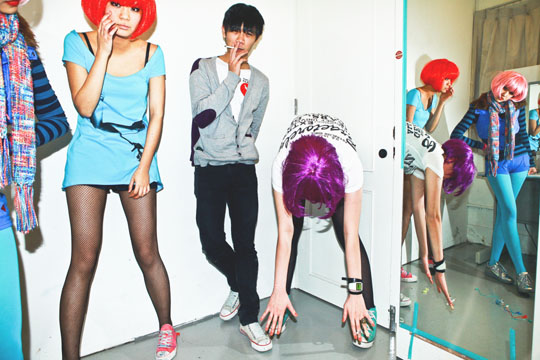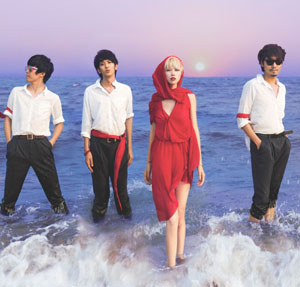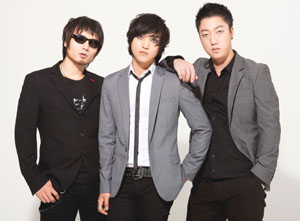
 Eastern promises: Taiwan's Go Chic think the Asian Calling portion of this year's Summer Sonic will be a great way to expose new bands to Japanese fans
Eastern promises: Taiwan's Go Chic think the Asian Calling portion of this year's Summer Sonic will be a great way to expose new bands to Japanese fans
Summer Sonic Prepares for an Asian Invasion
By Daniel Robson (Staff Writer)
(TOKYO JPN) Amid all the rivalry between Japanese and South Korean pop groups and the contrived debates about whether the manufactured crap from one country is better than the manufactured crap from the other, fans of independent or alternative music have been left scratching their heads.
Surely there's more to Korean music than just K-pop?
 Queen Sea Big Shark, from China, also think the event will help them and other Asian artists gain traction in Japan.The Asian Calling Stage at the Chiba leg of this weekend's Summer Sonic Festival will provide a definitive answer, sticking two fingers up at the slushy ballads and choreographed personalities that dominate the charts across Asia.
Queen Sea Big Shark, from China, also think the event will help them and other Asian artists gain traction in Japan.The Asian Calling Stage at the Chiba leg of this weekend's Summer Sonic Festival will provide a definitive answer, sticking two fingers up at the slushy ballads and choreographed personalities that dominate the charts across Asia.
That's because, over two days, 16 fresh-faced bands from Korea, China and Taiwan will commandeer the Island Stage (which this year has been moved from its usual tent outside Marine Stadium to inside the Makuhari Messe complex).
"I think the recent K-pop boom will help independent bands from around Asia to find an audience in Japan," says stage director Shinji Taniguchi, an employee of Summer Sonic organizer Creativeman. "Also, the idea behind this stage is for us to capture the attention of Asia — and by extension, the world."
Working with partners in each territory — Bad News, which operates live houses in China; Yescom Entertainment, organizer of the Pentaport Rock Festival in South Korea; and Taiwan's The Wall Music, an integrated agency for independent bands, Creativeman has cherry-picked a strong lineup of bands, some of whom have the potential to go on to big things in Japan.
Many of the acts have already played at international festivals such as mega-conference South by Southwest in Austin, Texas, as well as at regular club shows around the world. Some, including Taipei's neon electro-punk lasses Go Chic and Seoul's centrifugal psych-rockers Galaxy Express, have played shows in Japan before, too.
"The Japanese live scene is much more advanced than ours in Korea, so it's a great learning opportunity for us," says Galaxy Express vocalist/bassist Lee Ju Hyun.
Creativeman, a Tokyo-based agency that operates festivals and tours throughout Japan for domestic and international acts, is open about its reasons behind creating the Asian Calling Stage. Taniguchi cites several, including a hope to bolster Creativeman's presence in those countries with a view to one day possibly booking shows there. But more immediately, he aims to raise the profile of this clutch of pan-Asian bands at Summer Sonic so they will be able to come back for club tours over the coming years.
 Boys' generation: South Korean band Galaxy Express will give audiences in Japan an alternative to K-pop, which has now become popular with local music lovers."We already get a lot of visitors at Summer Sonic from China, Korea, Taiwan and also Hong Kong and Singapore," Taniguchi adds. "By putting on bands from those countries, we think more people will be enticed to come to Japan for Summer Sonic, and that they'll be delighted to see bands from their own country alongside artists from all over the world."
Boys' generation: South Korean band Galaxy Express will give audiences in Japan an alternative to K-pop, which has now become popular with local music lovers."We already get a lot of visitors at Summer Sonic from China, Korea, Taiwan and also Hong Kong and Singapore," Taniguchi adds. "By putting on bands from those countries, we think more people will be enticed to come to Japan for Summer Sonic, and that they'll be delighted to see bands from their own country alongside artists from all over the world."
Of course, by segregating all the Korean, Chinese and Taiwanese bands into one corner and not mixing them up on stages around the festival with other international bands (which this year include Red Hot Chili Peppers, Public Image Ltd and The Strokes), there is a risk that the Asian Calling Stage will become a ghetto. Indeed, a cynic might regard it as a hollow gesture designed to placate partners in territories that are growing in importance.
On the other hand, it could put these bands, most of whom are unknown in Japan, into a more attractive context and give them a better shot at getting seen.
"I think it's fine that all the Asian bands are on one stage together," affirms Galaxy Express' Lee. "Sure, it would be fun to appear on a stage with bands from other parts of the world, but the thing is, very few people know who any of these Asian bands are, so I think putting us all on one stage is a good solution."
"There are many good Asian bands who people might like, but it's hard to discover them," echoes Sonia Lai, guitarist/keyboardist with Go Chic. "This stage could be a good way to introduce them to the media and to the fans."
Kazutoshi Chiba, founder of Bad News, knows all about this. He opened the music venue Mao Live in Beijing and Shanghai with the express aim of helping to raise the quality of independent bands in China, where rock 'n' roll is a relatively new concept and where a shortage of equipment and know-how has made it hard for bands to progress.
Chiba selected all eight of the Chinese bands appearing on the Asian Calling Stage. He says he feels grateful to have this chance to put bands from China together with bands from Korea and Taiwan here in Japan.
"We should combine our power as Asian neighbors and work together to take the sound of Asia to the rest of the world," he says. "It's all about cultural exchange; the bands need to help each other in their respective territories to succeed.
"
Japan is a difficult market for foreign bands to crack. Its music business operates in a unique way; over 80 percent of music sales are made by domestic artists; and even the rock charts are dominated by bands backed by a major label or management company. Few concert agents or promoters are willing to take a risk on an unproven artist, and the DIY route involves ludicrous costs.
"Getting hold of a visa to perform in Japan is quite difficult for a Chinese band," adds Fu Han, vocalist with Queen Sea Big Shark, an electro-rock crossover band whose overseas tours have included the United States and South Korea. "Also, we don't know how the Japanese music industry works yet. I think it would go more smoothly for us if we had a management company in Japan."
Of course, if these bands didn't believe there were opportunities for them in Japan, they wouldn't bother coming. There's the allure of playing in one of the world's top-three music markets, for one thing. Japan was the first Asian country to integrate a Western music-business model, for better or for worse; and the huge J-pop section you'll find in music stores around Asia attests to the fact that Japanese pop culture is plenty influential.
"I've been to see some festivals in Japan before, which made me want to show the Japanese festival-goers how a Chinese band does it," Fu says. "It was my dream to play at Summer Sonic."
"Have any Taiwanese bands been successful in Japan before?" Lai asks rhetorically. "In all Asian countries, to some extent, people and the media tend to follow Western culture and pay less attention to their neighboring countries' culture. Fortunately, some people have started to notice that and they're trying to make something different."
The Asian Calling Stage is part of the Chiba leg of the Summer Sonic Festival at Makuhari Messe on Aug. 13 and 14 (ticket prices vary). For details, visit www.summersonic.com. Taiwanese bands Sunset Rollercoaster, Go Chic, Matzka and The White Eyes will also play Taiwan Calling at Daikanyama Unit in Tokyo on Aug. 15 (6 p.m.; ¥3,500 plus drink; [03] 3462-6969).
Asia is calling, but what is it saying?
In their own words, our top picks for the Asia Calling stage at Summer Sonic describe their sound:
Queen Sea Big Shark (China): "We try to create a surreal world of music, design and performance that the audience can come inside of and get lost."
Galaxy Express (South Korea): "I think our shows are pretty passionate, energetic affairs fueled by primal emotion."
Go Chic (Taiwan): "We hope we can make people dance and scream and spray beers around, because that's what we'll be doing on stage."
Rounding out the bunch, don't miss: Raunchy postpop provocateurs The White Eyes (Taiwan); sassy electro alterna-Gaga unit W&Whale (South Korea); low-key IDM (intelligent dance music) group Sunset Rollercoaster (Taiwan); moody postpunk trio Rebuilding the Rights of Statues (China); indie-rock fashion victims The Koxx (South Korea); melodic emo songsmiths Perdel (China); and genre-hopping folk-via-rock-via-jazz six-piece Namo (China). D.R.
International Digital Distribution (Galaxy Express / Idiotape / W&Whale) : DFSB Kollective